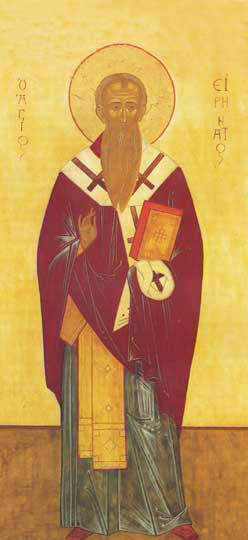
These very Martyrs, together with the clergy of Lyons, began to be anxious concerning the peace of the churches of Asia, which the faction of the Montanists had disturbed. And so they selected Irenaeus, whose person they considered of the greatest importance, as the one before all others whom they should send to Rome to Pope Eleutherius to ask, that, with the condemnation of the new dissidents by the authority of the Apostolic See, the cause of the dissensions might be removed. Already the bishop Pothinus had died a martyr and Irenaeus succeeded him. He applied himself so well to the duties of a bishop, that in a short time he saw not only all the citizens of Lyons, but also many of the inhabitants of other cities in Gaul cast aside their superstitions and errors, and enroll themselves in the Christian army. Meanwhile, a dispute had arisen concerning the date of the celebration of Easter. As the bishops of Asia were disagreeing with nearly all their fellow-bishops, the Roman Pontiff Victor had cut them off from the communion of the faithful. Irenaeus, however, who was zealous for peace, admonished him in a becoming manner, and urged, by examples of the practice of previous Pontiffs, that he should not suffer so many Churches to be cut off from Catholic unity, on account of a rite which they said they had received from their ancestors.
He wrote many works, which are mentioned by Eusebius of Caesarea and by St. Jerome, a great part of which have perished through the ravages of time. There are extant five books of his against heresies, written down about the year 180, while Eleutherius was still ruling the Christian commonwealth. In the third book, the man of God, instructed by those who, it is certain, had been hearers of the Apostles, gives to the Roman Church and to the succession of her bishops a testimony surpassing all others in weight and brilliancy, when he calleth her the faithful, perpetual, and most assured guardian of divine tradition. For he said, that with this Church it is necessary that the whole Church (that is, those in all places who are of the faithful) should agree, because of its more powerful preeminence. At length with almost countless others, whom he had himself brought over to the true faith and its practice, being crowned with martyrdom he passed to heaven in the year of salvation 202. At that time Septimius Severus Augustus had commanded that all those who wished to remain constantly steadfast in the practice of the Christian religion should be condemned to the most cruel torments and to death. The supreme Pontiff Benedict XV extended the feast of St. Irenaeus to the universal Church.




